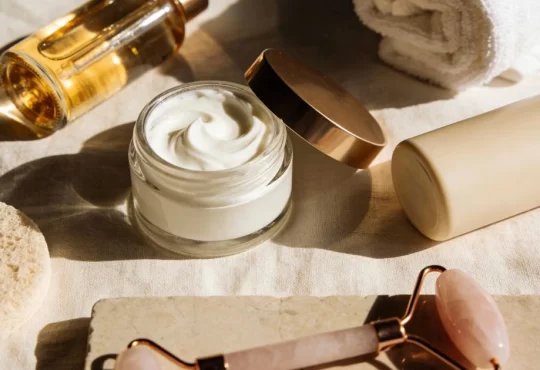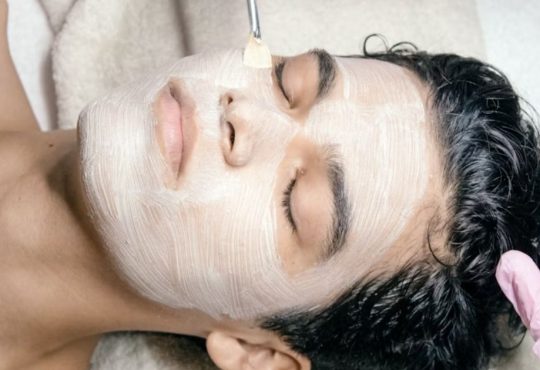
Struggling with dry, dehydrated skin? Fear not—there’s a tailored skincare routine just for you! Whether your skin feels tight, scaly, flaky, or a combination of these discomforts, we’ve got the solution. Our comprehensive dry skin regimen tips and recommended products are designed to leave your complexion feeling content, thoroughly hydrated, and radiant.
Dry Skin Factors
Dry skin can cause discomfort and typically manifests as scaling, itching, and cracking. Although it commonly affects the hands, arms, and legs, it can impact any body area.
Dry skin may stem from diverse causes, including environmental influences, hard water, genetics, excessive washing, irritant exposure, and underlying medical conditions such as hypothyroidism or diabetes. Medical aesthetician Olivia Sparks notes that these influences can usually be classified into two primary categories.
Dry skin causes can be categorized as either internal or external, with external factors being the simplest to address,” Sparks explains. These external factors include humidity levels, bathing practices, and harsh soaps.
Additionally, Sparks highlights the role of vitamin B deficiency in contributing to dry skin, flakiness, and cracked lips. A shortage of B vitamins “can also heighten sensitivity to certain skincare products and sunlight,” she notes. Seeking guidance from your healthcare provider regarding the supplementation of vitamin B complex is advisable.
Dry Skin Regimen Tips: Effective Skincare Guide for 2024!
Best Skincare Regimen
Although the reasons behind dry skin may vary, anyone can adopt a skincare routine tailored to dryness, yielding beneficial results.
Cleanse:
Start your skincare regimen with a mild yet effective hydrating cleanser that removes impurities without compromising the skin’s natural barrier. Look for cleansers infused with hydrating ingredients like hyaluronic acid to replenish moisture levels and leave the skin feeling refreshed and supple.
Tone:
Follow up with an alcohol-free toner that helps restore the skin’s pH balance and prepares it to absorb subsequent skincare products better. Opt for toners enriched with soothing and hydrating ingredients to nourish the skin while refining pores and minimizing redness and irritation.
Target:
Address specific skin concerns with a potent serum tailored to your needs. Whether targeting hydration, combating signs of aging, or addressing blemishes, choose serums formulated with active ingredients like antioxidants, peptides, or vitamin C to rejuvenate and revitalize the skin.
Moisturize:
Lock in hydration and nourishment with a rich, noncomedogenic moisturizer to replenish and protect the skin’s moisture barrier. Seek out moisturizers infused with emollients and humectants to retain moisture and maintain skin softness, smoothness, and hydration throughout the day.
Protect:
Safeguard your skin by applying a broad-spectrum sunscreen. To complete your skincare regimen. Choose sunscreens that offer UVA and UVB protection and are suitable for your skin type to prevent sun damage and premature aging while promoting overall skin health.

Skincare Routine for Dry Skin with Acne
Balancing, clearing blemishes, and maintaining hydration are essential for individuals managing acne and dryness. Here are some helpful tips to achieve both:
- Opt for lightweight, noncomedogenic products to avoid clogging pores and exacerbating acne. Avoid heavy oil-based lotions, moisturizers, and sunscreens that may further contribute to breakouts.
- Limit cleansing to once daily to prevent stripping the skin’s natural oils, which can worsen dryness and trigger more acne. Choose a gentle, hydrating cleanser that removes impurities without overdrying the skin.
- Avoid harsh exfoliants that can aggravate dryness and inflammation. Instead, opt for gentle exfoliation methods such as enzymatic or chemical, and limit exfoliation to 1-2 times per week.
- Be cautious when drying acne-fighting ingredients like benzoyl peroxide and salicylic acid, as they can further dehydrate the skin. Use them sparingly, and consider incorporating hydrating products into your routine to counteract dryness.
- Look for skincare products free of alcohol, dyes, and fragrances, as these may irritate sensitive skin. Opt for noncomedogenic formulations that won’t clog pores or aggravate acne.
All-Natural Approach for Dry Skin
For those with dry skin seeking natural solutions, there are several effective remedies, particularly for facial care. Coconut oil is a versatile emollient, suitable for delicate areas like the under-eyes and around the mouth, providing essential hydration. Oatmeal, known for its soothing properties, can alleviate redness and itching when incorporated into homemade face masks, promoting a calm complexion. Additionally, increasing omega-3 fatty acid intake through foods like flaxseeds, salmon, and walnuts can effectively address dryness and support overall skin health.
Skincare Routine’s Affordability Tips
Navigating various products and steps might seem overwhelming when adhering to a skincare routine while maintaining affordability. Fortunately, there are a plethora of budget-friendly options tailored for dry skin. Explore choices available at your nearby drugstore or through online platforms. Take time to review ingredient lists and feedback from individuals with dry skin to make informed decisions. Remember, a hefty price tag doesn’t guarantee superior efficacy for your skin’s needs.
Whole Body Skincare Regimen for Dry Skin
For an effective skincare regimen targeting dry skin on the body, follow a routine akin to your facial skincare regimen, with variations in product selection. Initiate the process with cleansing, opting for products formulated with moisturizing components like cocoa butter, olive oil, aloe vera, jojoba, avocado, glycerin, lanolin, or hyaluronic acid. Subsequently, transition to moisturization, ideally applying products while the skin is still damp. Seek out creams or ointments containing nourishing components like jojoba oil, glycerin, hyaluronic acid, shea butter, or ceramides. You may discover that ointments or creams are more beneficial than lotions due to their higher oil and lower water content, offering deeper hydration and longer-lasting moisture retention.
Dry patches commonly occur on the elbows and knees. Generally, moisturizing these areas follows the same routine as the rest of your body. However, using an ointment with a higher oil content and taking longer to absorb than a cream is more effective. If dry patches persist and could indicate a dermatological condition like eczema or psoriasis, you must consult your healthcare provider for suitable diagnosis and treatment.
Dry Skin Skincare Routine for Men
A dry skin care routine for men mirrors that of any other individual, emphasizing universal skincare practices irrespective of gender, though preferences in scents and packaging may vary.
What not to do:
- Reduce your caffeine intake and be mindful of your consumption. Excessive consumption can lead to dehydration, resulting in dryness and skin irritation. Opt for moderation and balance in your caffeine consumption to maintain skin health.
- Moderate hot water: While hot showers or baths can be soothing, prolonged exposure to hot water can deplete the skin’s natural oils, resulting in dryness and possible damage.the possibility of damage. Instead, use warm water to cleanse the skin and preserve its moisture barrier.
- Avoid harsh products: Certain skincare products containing chemicals like chemical peels, retinoids, glycolic acid, benzoyl peroxide, salicylic acid, alcohol, fragrance, and preservatives can aggravate dry skin. Opt for gentler alternatives and read product labels carefully to avoid ingredients that may exacerbate dryness.
- Apply sunscreen regularly: Shield your skin from damaging UV rays regularly, even on cloudy days. Sun exposure can contribute to dryness and early aging, so it’s essential to safeguard your skin with broad-spectrum sunscreen to maintain health and hydration.
- Moisturize adequately: Keep your skin hydrated by moisturizing it at least twice daily, preferably on damp skin, to lock in moisture. Choose moisturizers rich in hydrating ingredients like hyaluronic acid, glycerin, and ceramides to replenish and nourish dry skin, promoting a healthy and supple complexion.
- Dry skin safety: While dry skin is generally harmless, it may indicate underlying conditions such as eczema or psoriasis. If you suspect an underlying skin issue, Seek advice from a healthcare professional for precise diagnosis and suitable treatment. Additionally, wear gloves when exposed to chemicals or prolonged water contact to protect your skin barrier integrity, prevent infection, and maintain overall skin health.

Topnotch Products for Dry Skin:
Take a glance at some top picks for combating dry skin:
- Best cleansers: Consider Cetaphil Gentle Skin Cleanser or CeraVe Hydrating Facial Cleanser for a gentle yet effective cleanse.
- Best toners: Alaffia Everyday Coconut Face Toner or Cocokind Rosewater Facial Toner can help hydrate and balance dry skin.
- Best serums: Try The Ordinary Hyaluronic Acid 2% + B5 or Beekman 1802 Milk Drops Probiotic Ceramide Serum for deep hydration and nourishment.
- Best firming moisturizer: SkinFix Barrier+ Triple Lipid-Peptide Face Cream provides intense hydration while promoting skin firmness.
- Best eco-friendly moisturizer: Youth to the People Adaptogen Deep Moisture Cream offers sustainable hydration with botanical extracts.
- The top choice for a moisturizer for acne-prone skin is Neutrogena Hydro Boost Water Gel, which provides lightweight hydration without clogging pores.
- Top pick for tinted moisturizer: First Aid Beauty Ultra Repair Tinted Moisturizer offers hydration and sheer coverage for a natural glow.
- Best affordable moisturizer: Dermasil Labs Oil-Free Facial Creams deliver moisture without breaking the bank.
- Best mineral facial sunscreen: ISDIN Eryfotona Actinica provides broad-spectrum protection while nourishing dry skin.
- Best chemical facial sunscreen: La Roche-Posay Anthelios offers advanced sun protection with a lightweight, non-greasy formula.
- Most Affordable Facial Sunscreen: Neutrogena Hydro Boost Water Gel Lotion Sunscreen is the best affordable facial sunscreen, which protects dry skin without leaving a sticky residue.
- Best body cleansers: Choose Sebamed Gentle Hydrating Cleanser or CeraVe Hydrating Cleanser Bar for a moisturizing cleanse.
- Best body lotion: AmLactin Rapid Relief Restoring Lotion is formulated with alpha-hydroxy acids to exfoliate and hydrate dry skin.
- Best body cream: Ceramedx Ultra Moisturizing Cream provides long-lasting hydration for dry, rough skin.
- The best ointments for dry patches are Aquaphor Healing Ointment or Lanolips 101 Ointment Multipurpose Superbalm, which offer intensive moisture to soothe and heal dry patches effectively.
Whether it’s an established skincare routine, your hair washing frequency, or the makeup products you’re interested in, beauty is a deeply personal experience. That’s why we entrust a diverse community of writers, educators, and experts to impart their insights on everything from the nuances of product application to recommending the ideal sheet mask for your unique requirements. We only endorse products we genuinely adore, so if you encounter a shop link to a particular item or brand, rest assured our team has meticulously vetted it.
Conclusion:
Identifying the right moment to seek professional help for dry skin is crucial for effective management. If your dry skin becomes increasingly uncomfortable or proves resistant to self-treatment, it’s advisable to consult a dermatologist. They can comprehensively evaluate whether the underlying cause stems from environmental factors or skin issues like eczema or psoriasis. Collaborating with a dermatologist enables the development of a customized treatment strategy designed to address your requirements, incorporating a combination of over-the-counter or prescription products to alleviate symptoms and restore skin health.





